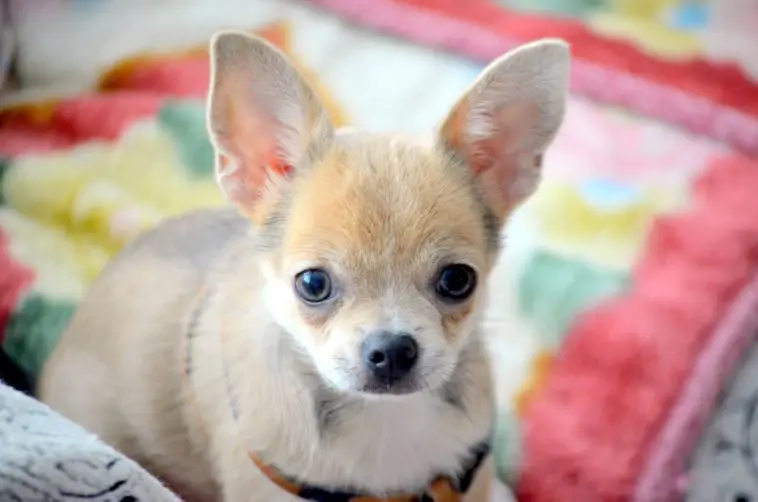Why are Chihuahuas so nervous?
Let’s face it: we all live in stressful times. Managing jobs, kids, and other aspects of daily life can make us stressed out and anxious most of the time.
So why should it be any different for our dogs?
Chihuahuas are especially notorious for being anxious and nervous. Probably they get it from us! After all, dogs pick up our moods and know when we are stressed and moody. Resultantly, these little dogs tend to worry about numerous things too!
As a Chi parent, I understand how your pet’s nervousness can take a toll on your relationship with your pooch.
That is why I have come up with this guide to help you manage your Chihuahua’s nervous behavior. Read on for important tips and steps you can take to control your Chi’s nervousness.
Also Read: How to Get a Chihuahua Like You
Why Are Chihuahuas so Nervous All the Time?
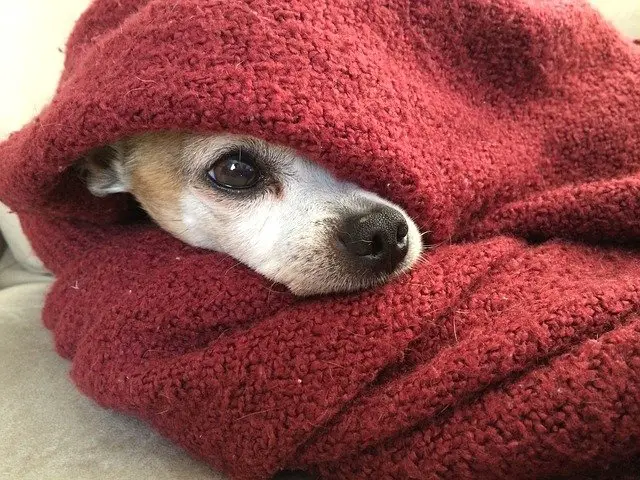
Sometimes, we can easily tell what is making our beloved Chihuahuas anxious, high-strung, or nervous.
For example, last week, we had some construction going on in our yard. There were many laborers working with noisy drills and machines.
So it was no surprise to see our 8-yr old Chihuahua, Bella, shaking like a leaf.
However, things aren’t always as straightforward and often we cannot tell what is eating her and making her fearful.
Since we all want our dogs to be healthy and happy all the time, it is very important for us Chihuahua parents to quickly determine and eliminate the source of our dog’s anxiety.
Let us take a look at some of the most common reasons ‘why are Chihuahuas so nervous?’ all the time.
1. Lack of socialization
Let us face it. A poorly socialized Chihuahua will be more likely to show signs of chronic nervousness and anxiety.
They lack exposure to different objects, situations, people, and other dogs. And that gets them ‘shaking’ or cowering with fear when faced with anything that is out of the ordinary.
That is why socialization plays a huge role in how your Chihuahua shapes up. Ideally, you must start socializing your Chihuahua puppy from a young age, although socialization and desensitization are even known to work miracles in adult Chihuahuas as well.
2. Genetic predisposition
Some Chihuahuas have genetic predisposition to nervousness, phobia, and fear. The parents might have been nervous, fearful or shy and the trait is passed on to the litter.
3. Past trauma
Many rescued Chihuahuas tend to show perennial nervousness because of some past trauma or abuse.
It is really sad to see these dogs nervous all the time when it really isn’t their fault. One can only hope that all these rescued Chihuahuas get to go to kind and loving homes where they can erase their past and start blossoming into their true personalities.
Traumatic experience can also occur in any dog. Even if your Chihuahua is suddenly startled on its walk by a firecracker, it could develop nervous anxiety while walking along the same road again.
4. Separation anxiety
Chihuahuas are loyal and loving dogs and they form close, loving bonds with their families. If your Chihuahua pup isn’t used to being left home alone, then it could become very nervous if you suddenly start leaving alone for prolonged periods of time.
Many Chis even tend to become fearful and anxious all the time as a result of loneliness.
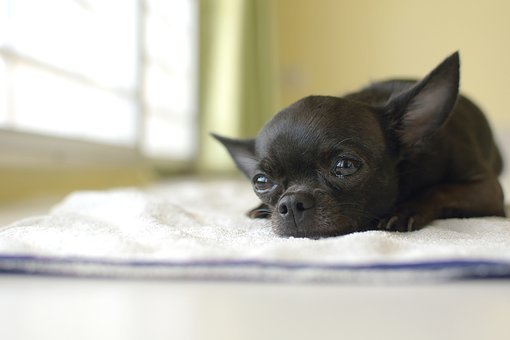
5. Boredom/lack of mental stimulation
Bored Chihuahuas can also show signs of nervousness. Since they have nothing to do they bring the old adage to life that ‘an empty mind is a devil’s workshop’. Their little brain makes them afraid and high-strung.
More often, Chihuahuas that are alone all day while their families leave for work or school tend to be more nervous than dogs that have other house pets for company.
6. Lack of exercise
Without exercise, your Chihuahua cannot produce endorphins or ‘feel-good’ hormones that are responsible for happiness, joy, and other positive feelings.
If you have made your Chi a couch potato, chances are that you have unknowingly made it very nervous and anxious as well.
7. Pain or underlying health issue
Often, we pet parents mistake pain for fear, anxiety or nervous behavior problem. A Chihuahua that shows fear at the vet might seem ‘hand shy’ to us but in reality, might be fearful of being touched because of an undiagnosed medical problem.
8. Not getting adequate attention from pet parent/s
In many Chis, the lack of attention from owners can also make it very anxious. Your Chihuahua’s daily life has a lot of impact on its temperament. If your Chihuahua does not get the attention it needs, it could seem to be afraid of everything.
How to Know if Your Chihuahua is Nervous – Signs of Nervousness in Chihuahuas
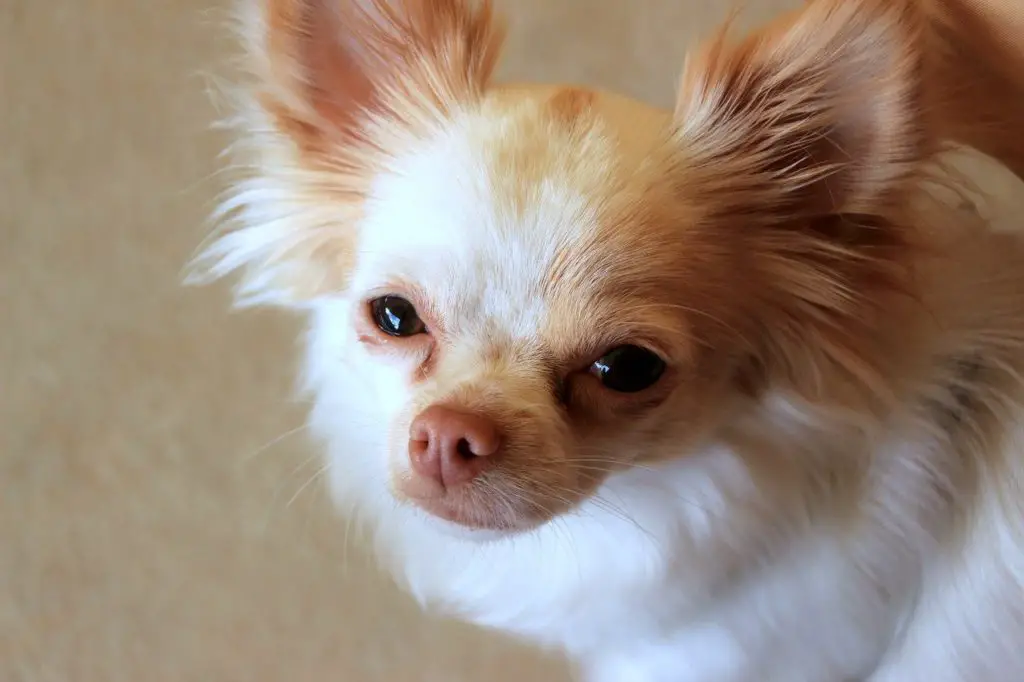
It can be very limiting having a Chihuahua that suffers from nervousness. You might feel uncomfortable seeing your dog nervous, shaking, and cowering at the slightest of noises.
The worst is the feeling of powerlessness and helplessness as you cannot do anything when your small dog trembles, hides or starts crying.
A little bit of fear in dogs is natural but it can get to be an issue if your Chi has an extreme reaction to every small situation.
Moreover, it can get embarrassing if your dog barks excessively or urinates in front of other people.
Here are some common signs of nervousness in Chihuahuas:
1. Spontaneous elimination
Many Chihuahuas urinate or defecate indoors when they feel anxious or scared. Often, a Chi might urinate when the owners are about to leave for work and school or when other people come visiting. This signs of nervousness can become an embarrassment and worse, a daily hassle.
2. Destructive behavior
A nervous Chihuahua might even chew sheets, linen, clothes, slippers, and furniture. The chewing action soothes its nerves and could become a daily thing every time it is left alone. Many show aggressive behavior as well.
3. Changes in body language
Different dogs display different outward signs of nervous behaviors. Some Chis have dilated pupils. Others tend to pant, pace, whimper, or tuck their tail in between their legs.
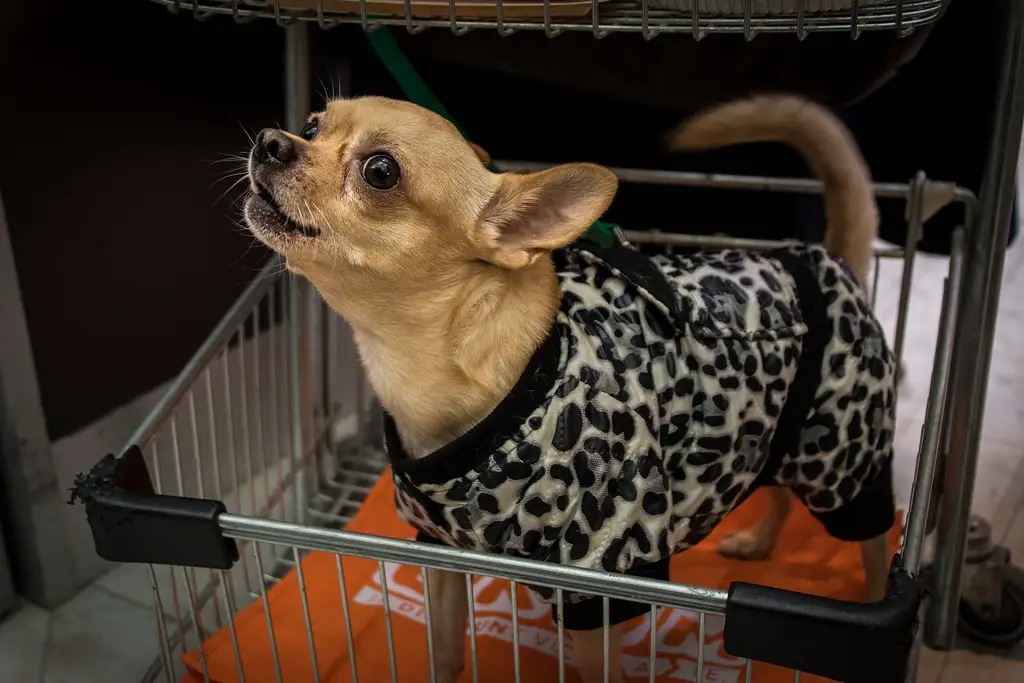
4. Excessive licking
Your Chi might try to soothe itself by licking its privates, paws, or even licking you. Excess licking is a sign of saying: please don’t leave me.
Excessive self-licking could lead to lick granulomas – large lesions in the area licked constantly.
5. Displacement behaviors
Other signs of nervousness in Chihuahuas include yawning, pacing, lip licking, “shaking it off” like it does after bath, air sniffing, fidgeting, trembling, etc. Some dogs also freeze in place, move in slow-motion, or run away and hide. Shivering Chihuahua is also common.
6. Appetite changes
Over-eating or, conversely, eating less than usual is also one of the signs of anxiety and nervousness.
While many of these outward signs are sometimes considered normal, you shouldn’t ignore them if they become extreme or start to occur routinely.
How to Help Your Anxious or Nervous Chihuahua?
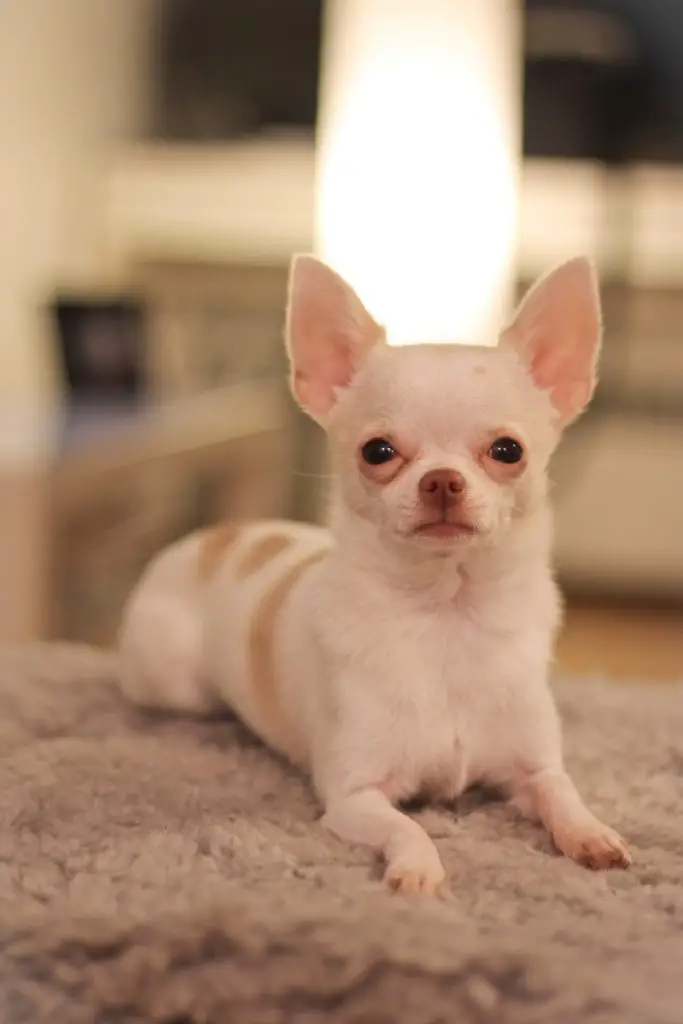
There are several ways to deal with a nervous Chi:
1. Remain calm yet assertive
The last thing to do when your dog shows signs of fear or nervousness is to feed its fear.
Chihuahuas learn through positive reinforcement which means that when you comfort, pat, or show affection to your Chi while it is afraid or trembling, it might actually ‘do more’ of the thing it was doing at the time you comforted it.
This means that it interprets your comforting as a sign of ‘it is OK to be afraid’.
That is why it is important not to comfort or shower a fearful dog with affection. Instead, remain calm and assertive and distract your pet so that it understands that the ‘thing’ that scared it may not be as scary as it is making it out to be.
2. Help your Chi feel safe
This is your first priority. You must make your Chihuahua feel assured that it is in a safe environment. Depending on what your dog is afraid of, you can take the necessary steps to ensure it is not in danger.
This can mean the following:
- Providing it a safe and secure environment – either a crate or a room of its own. If loud noises scare your pet, then install sound dampening windows or draw the curtains.
- Walk it at a time when no other dog is likely to cross its path.
- Give your Chihuahua a predictable routine – timely meals, exercise, naps, etc.
3. Use systematic desensitization
Systematic desensitization means gradually exposing your Chihuahua to the situation, object, another dog etc. that your pet is fearful of.
The key is to do this very systematically and gradually. For example, if your Chi gets nervous during fireworks, then you can use recordings or CDs of loud noises like thunder or fireworks.
- Play the CD at low volume in the room adjacent to your dog’s room/ crate
- As the next step, play it at slightly higher volume in its room.
- Gradually, over time, as your Chi gets more and more comfortable, increase the volume up by notches.
Over time, if you do this properly, your Chi will learn to tolerate the sounds.
4. Use counter-conditioning
Counter conditioning is based on Pavlov’s famous experiment. Pavlov’s dogs started salivating each time he rang a bell because their brains associated the sound of the bell with food.
You can use the same thing for your Chihuahua’s nervousness.
For example, if your Chi is afraid of other dogs at the Dog Park:
- Take your Chihuahua to the dog park
- Give it a treat when another dog approaches.
- Continue treating every time other dogs approach.
- Your pet will start associating the presence of other dogs with yummy treats.
5. Never punish your nervous Chi
The last thing you’d want is an even more fearful or nervous Chihuahua on your hands.
Avoid hitting, punishing, or shouting at your dog. This might not only make your Chi more fearful of the thing it is afraid of, worse, it might become afraid of you.
So only use positive reinforcement techniques to train your Chihuahua to be less nervous.
6. Give it a job to do
To your Chihuahua that has separation anxiety, giving something to do can help distract it. Most importantly exercise your furry friend everyday (preferably twice a day) for at least 15 minutes each. This will release feel good hormones and calm your pet.
Next, crate your Chi and give it a No products found. to chew on it and get those delicious treats out.
This will mentally stimulate your pet, distract it, and also prevent misbehaviors like furniture chewing, urination, barking, etc.
FAQs on Why Are Chihuahuas So Nervous?
1. What can I give my Chihuahua for anxiety?
Some vets prescribe anti anxiety medication, CBD oil or medicines like Clomicalm for nervous dogs. When used with behavior modification and desensitization, they can help prevent defecation, urination, destructive chewing, and other unwanted behaviors in a nervous or anxious dog.
2. Are Chihuahuas naturally nervous?
Yes, Chihuahuas as a dog breed are known to shake and be nervous or afraid of everything. From bright lights, to loud noises, to fireworks, and other dogs, most Chis are afraid of all this and more.
It could be genetic predisposition but mostly it is a lack of socialization that results in canine nervousness.
3. How do you get a Chihuahua to trust you?
The best way to get your Chi to trust you is to portray yourself as a non-threat. Play with it, take it on walks, talk to it in a calm and soothing tone. Most importantly, spend time with it, as much possible. Provide it a safe and nurturing environment and soon it will start trusting you.
4. Can Chihuahuas die from being scared?
There are unfortunate reports of dogs having shorter lifespans due to fear.
Vets believe that fear or anxiety may not be directly responsible for a Chihuahua’s death although they could lead to heart conditions that could be fatal.
Conclusion

Why are Chihuahuas so nervous? Why do Chihuahuas shake?
Chihuahuas are nervous because of the ‘small dog syndrome’. Their small size makes them anxious and scared of things, people, and other larger dogs.
Sometimes, their fear or nervousness can come from genetic predisposition – a fearful dam will give birth to timid or fearful pups.
Most often though, nervousness and fear stem from a lack of socialization, so with proper training, desensitization, and counter-conditioning, you can turn your anxious Chi into a less nervous and happier dog.
